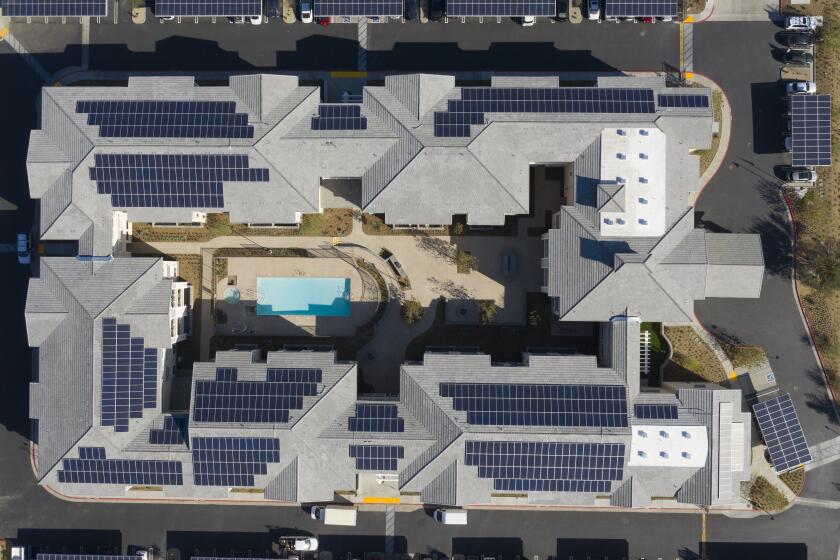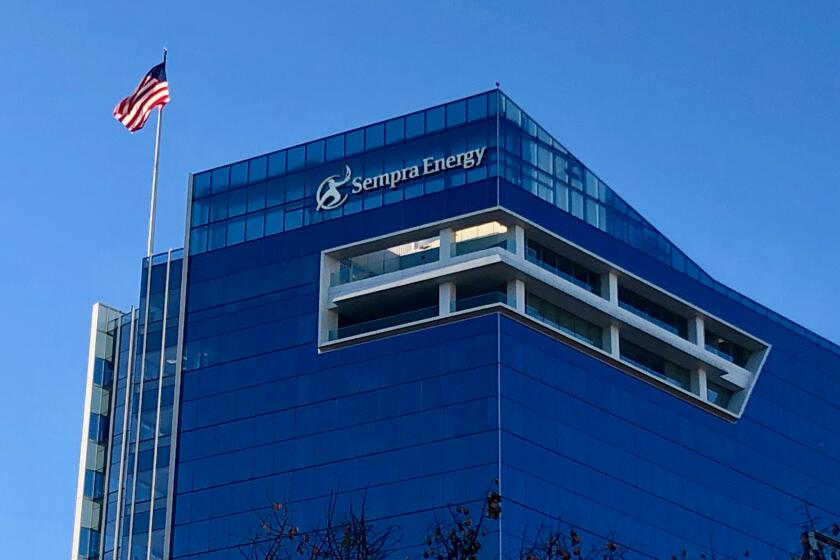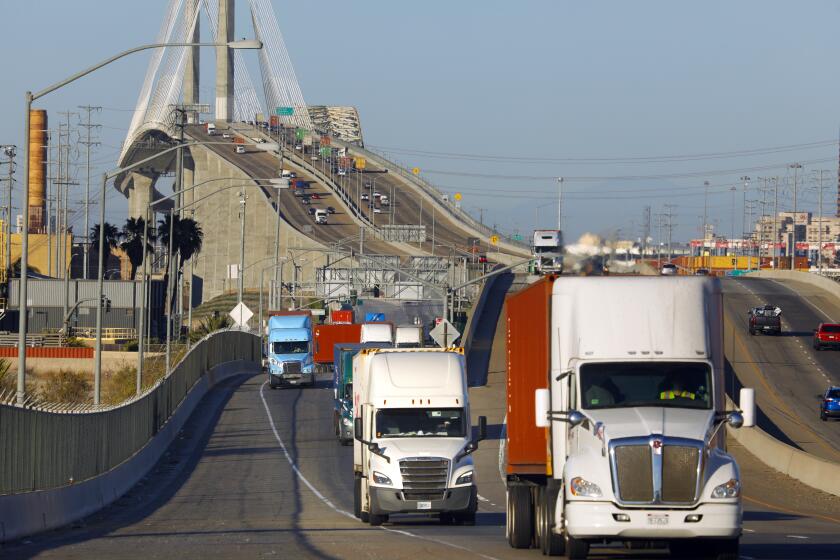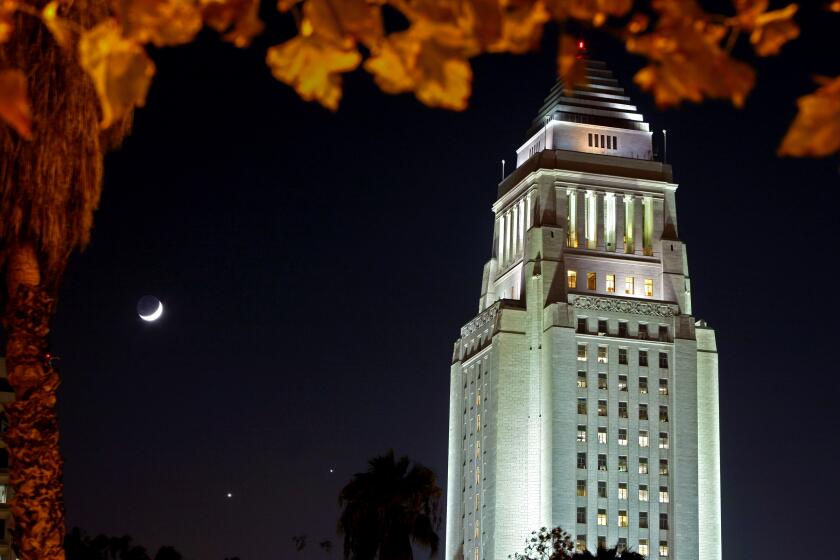California settles climate lawsuit with fossil fuel giant SoCalGas
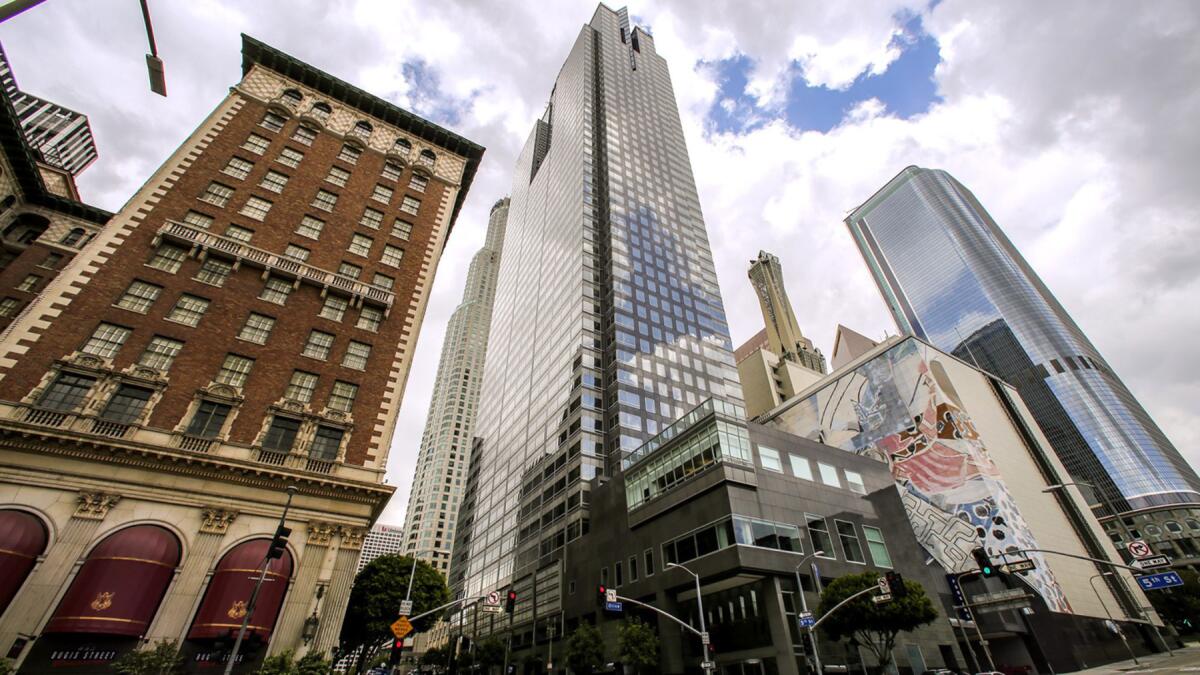
- Share via
A fight between the nation’s largest gas utility and California’s influential climate change regulators has reached a quiet conclusion — but it won’t be the last such battle as the Golden State hurries to eliminate heat-trapping fossil fuels.
Southern California Gas Co. and the California Energy Commission agreed to settle a lawsuit brought by the Los Angeles-based utility company. SoCalGas had claimed state officials were flouting a law requiring them to consider the benefits of natural gas — one of the fossil fuels responsible for the worsening fires, floods and heat waves of the climate crisis.
The company agreed to drop the suit even though the agency didn’t take the steps it demanded and has no plans to do so, Energy Commission spokesperson Lindsay Buckley said. She didn’t provide details of the settlement, which was finalized Aug. 26.
“Transitioning away from an economy that is based on fossil fuels is a necessary challenge and requires constructive dialogue and creative thinking that happens when all parties are at the table working cooperatively,” David Hochschild, who was appointed by Gov. Gavin Newsom to chair the Energy Commission, said in a written statement.
SoCalGas wouldn’t say specifically why it agreed to drop the lawsuit, filed last year in Orange County Superior Court. Asked about the settlement, company spokesperson Christine Detz said the Energy Commission “is holding workshops and studying scenarios to help the state reach its greenhouse gas emissions goals, including the role that clean fuels like hydrogen and renewable natural gas will play.”
Record heat. Raging fires. What are the solutions?
Get Boiling Point, our newsletter about climate change, the environment and building a more sustainable California.
You may occasionally receive promotional content from the Los Angeles Times.
“We appreciate the broad and inclusive process the [commission] is taking and look forward to working together toward our shared goals,” Detz said in an email.
As California looks beyond coal — which will soon be eliminated from its power supply — it’s seeking out strategies for replacing natural gas, which is cleaner than coal and oil but still fuels climate change and releases lung-damaging air pollution.
SoCalGas has emerged as a powerful opponent of that push.
A coalition backed by the gas company and other business groups persuaded more than 100 cities and counties to pass resolutions calling for “balanced” energy policies — an attempt to slow the tide of local governments banning or discouraging gas hookups in new construction. Clean-energy advocates say replacing gas heaters and stoves with electric appliances will not only reduce planet-warming emissions but also limit indoor gas leaks that research shows can contribute to asthma and heart disease.
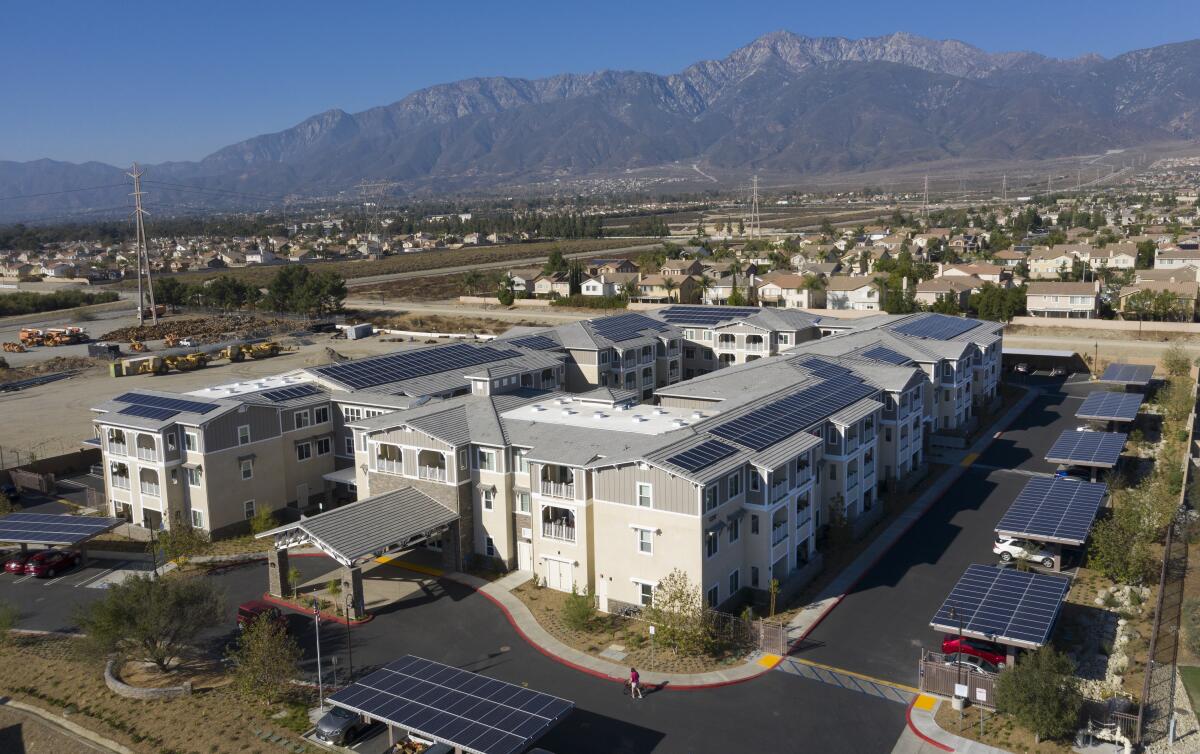
The gas company also questioned the rationale behind the Energy Commission’s recent decision to encourage all-electric buildings statewide. The commission stopped short of banning gas in new construction, but approved rules that will require developers to include wiring that allows for later installation of electric heat pumps and cooktops. In written comments to the state agency, SoCalGas suggested the regulations could make housing more expensive and lead to higher energy bills.
The company says its pipelines are crucial for confronting the climate crisis, arguing that slashing emissions from power plants, vehicles and homes will be far easier and cheaper if fuels such as hydrogen and renewable gas are subbed in for fossil gas. Many climate experts and advocates are skeptical, arguing that an electric grid powered by solar panels, wind turbines and batteries is the best solution for cleaning up pollution across most parts of the economy.
Gov. Gavin Newsom promised “giant leaps forward” on climate. But so far state officials haven’t embraced a push to require all-electric buildings.
SoCalGas serves 21.8 million customers from the San Joaquin Valley to the U.S.-Mexico border and brought in $4.7 billion in operating revenue last year. Its corporate sibling, San Diego Gas & Electric, also has an extensive pipeline network.
Both utilities are owned by Sempra Energy of San Diego, which is investing billions of dollars in export terminals to take natural gas produced in the United States and send it overseas. Sempra opposes a proposal in the state Legislature, Assembly Bill 1395, that would require California to slash its planet-warming carbon dioxide emissions to 90% below 1990 levels by 2045 — a target roughly in line with what scientists say is needed globally to avoid the most devastating consequences of a rapidly heating planet.
Sempra “is just very much wedded to natural gas being part of reducing emissions,” said Daniel Stewart, a program manager at As You Sow, a nonprofit that works with corporate shareholders to advocate for stronger climate action.
Sempra subsidiary SoCalGas is working with a high-powered lobbyist on a new advocacy group that will promote natural gas.
Joining SoCalGas in its lawsuit against the Energy Commission was Clean Energy Fuels Corp., a Newport Beach company that owns natural gas fueling stations. The Times and nonprofit news outlet Floodlight reported last month that a campaign firm being paid by Clean Energy Fuels had hired unsuspecting local residents near the ports of L.A. and Long Beach to argue for natural gas-fueled trucks, rather than zero-emission electric trucks, as the best solution for cleaning up dirty air at the ports.
Clean Energy Fuels declined to comment on the lawsuit settlement. A company executive previously told The Times that he didn’t know anything about the campaign firm paying local residents during the debate at the ports in 2017.
“We support California’s environmental goals and efforts to reduce carbon emissions from the energy and transportation systems. However, achieving those goals does not require minimizing the role of natural gas,” Clean Energy Fuels spokesperson Raleigh Gerber said in a written statement last year, when the lawsuit against the Energy Commission was filed.
Residents around the ports of L.A. and Long Beach were paid to show support for natural gas trucks at community hearings.
Also joining the lawsuit were three chapters of the Utility Workers Union of America, collectively representing nearly 5,000 SoCalGas employees, many of whom could lose their jobs if the state successfully phases out gas pipelines.
An attorney representing the three chapters — UWUA Locals 132, 483 and 522 — didn’t respond to an email asking about the settlement. But in a written statement when the lawsuit was filed, the presidents of the three locals argued that state officials had “embarked on a self-guided excursion into fuels policy that, contrary to law, would minimize the use of natural gas.”
“We are advocates for making the best use of all available fuels, consistent with the goal of dramatically reducing the carbon footprint of our advanced economy,” they said at the time. “Substituting electricity for natural gas in some applications may make sense, but an unexamined assumption that this is always the case and should always guide policy defies common sense.”
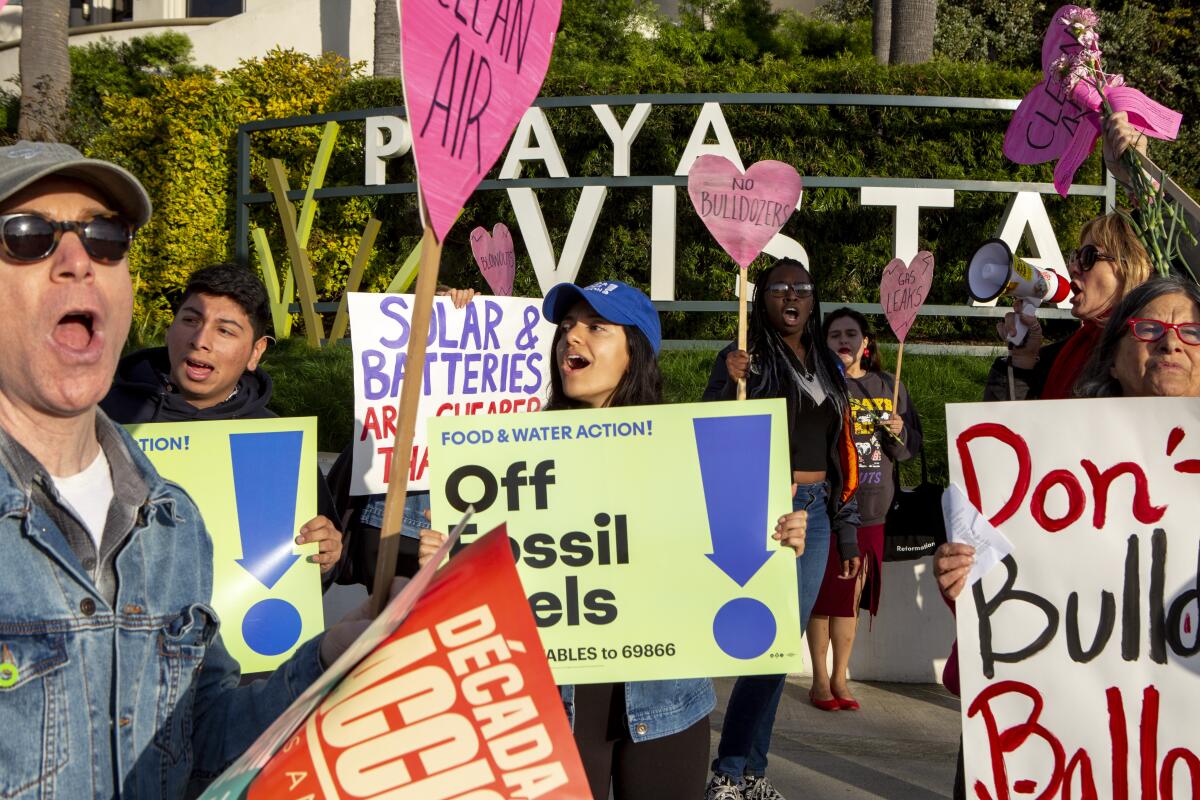
The law firm representing SoCalGas in the suit was Sullivan & Cromwell, which received an F grade in a climate change “scorecard” released last month by Law Students for Climate Accountability. The report assigned letter grades to the country’s 100 most prestigious law firms based on their clients, with more work on behalf of fossil fuel companies leading to a worse score and any work on behalf of renewable energy companies potentially lessening the harshness of the decree.
Sullivan & Cromwell representatives didn’t respond to an email seeking comment on the F grade.
In a related legal fight, a federal judge recently dismissed a lawsuit brought by the California Restaurant Assn. against the city of Berkeley, which in 2019 approved the nation’s first ban on gas hookups in most new buildings. The restaurant group appealed last month. The case is seen as an early test of whether dozens of similar policies in other cities will survive legal scrutiny.
“The loss of flame cooking in restaurant settings would dramatically impact restaurant kitchens, where chefs rely on gas stoves to grill vegetables, sear meats and create meals,” Jot Condie, president of the restaurant association, said in a written statement.
We asked L.A. City Council members where they stand on requiring all-electric heating and cooking in new housing.
Climate activists have long suspected the gas industry of funding the lawsuit. In a news release sent on behalf of Earthjustice and the Sierra Club this summer, public affairs firm Sunstone Strategies pointed to a newly filed disclosure form showing SoCalGas paid nearly $1.8 million last year to Reichman Jorgensen, the law firm representing the restaurant association. SoCalGas also increased its contributions to the nonprofit associated with the restaurant association to $146,000 in 2020 from $24,000 in 2019.
Detz, the gas company spokesperson, said the payments to Reichman Jorgensen are “unrelated” to the firm’s work on the gas ban lawsuit. The firm “provides legal support to our General Counsel’s office, among other legal activities,” Detz said in an email.
Support our journalism
Your support helps us deliver the news that matters most. Subscribe to the Los Angeles Times.
As for SoCalGas’ donations to the associated nonprofit, restaurant association spokesperson Sharokina Shams said in an email that utility companies Pacific Gas & Electric and SDG&E have also donated, with the money funding “hardship grants to small restaurants and to restaurant workers.” SoCalGas spokesperson Chris Gilbride pointed to the COVID-19 pandemic’s impact.
“We’re proud of the work we’ve done to support these small businesses over the last year and to help the restaurant industry get back on its feet,” Gilbride said in a written statement earlier this year.
Sarah Jorgensen, a founding partner at Reichman Jorgensen, said it would be unethical to discuss fee arrangements with clients.
More to Read
Inside the business of entertainment
The Wide Shot brings you news, analysis and insights on everything from streaming wars to production — and what it all means for the future.
You may occasionally receive promotional content from the Los Angeles Times.
